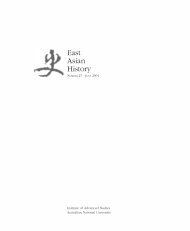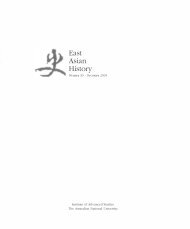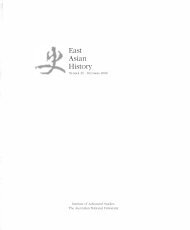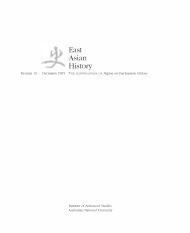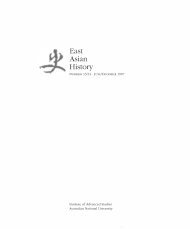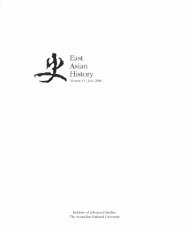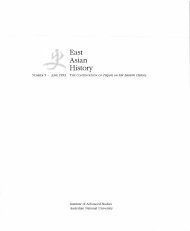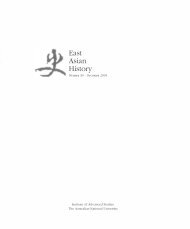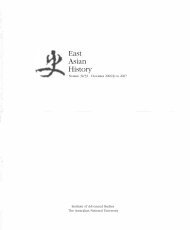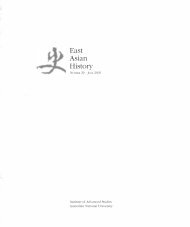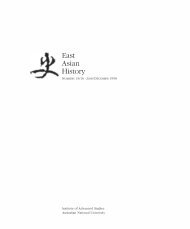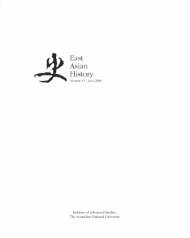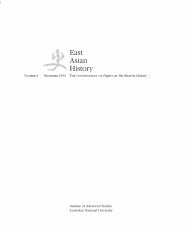East Asian History - ANU
East Asian History - ANU
East Asian History - ANU
- No tags were found...
Create successful ePaper yourself
Turn your PDF publications into a flip-book with our unique Google optimized e-Paper software.
36LEWIS MAYO111 Baiquege B '&=!if, P.2594vandP.2864v.There are several transcriptions, but thetranslation given here is based on that by LuXiangqian in his Dunhuang Tulufa n wenshulungao, pp.l72--4. There is some controversyabout the dating of the text. I accept thearguments put forward by Rong Xinjiang inGuiyi jun shi yanjiu, p.219, which put it at910. The date of 905 has been advanced byLi Zhengyu in "Guanyu Jinshan guo heDunhuangguo jianguo de jige wenti" [Severalquestions regarding the establishment ofthe Jinshan kingdom and the Dunhuangkingdom] in Li Zhengyu, Dunhuang shidixinlun [New discussions on Dunhuanghistorical geography] (Taipei: Hsin-wenfeng,1996), pp.193-222. Li's date is endorsedin Zheng Binglin, "Tang Wudai DunhuangJinshan guo zhengfa Loulan shikao" [Anexamination of the campaign against Loulanby the Jinshan kingdom of Dunhuang in theTang and Five Dynasties], in Zheng Binglin,ed., Dunhuang Guiyi jun shi zhuanli yanjiu,pp.I-24.112 The word jin means primarily 'metal' inmany of the contexts discussed here.However, because of the strong non-Chinese(especially Turkic) rhetoric around goldenmountains (discussed below), gold seemsnot inappropriate as a translation.113 The Jinshan Guo was established inAutumn Oth/8th month) of 910, to takegreatest advantage of the signs of autumn:the gold or metal element, the colour white,the direction west (which all correspondwith each other in Five Elements theory),and the killing energies of an approachingwinter, capable of striking down enemies(Rong Xinjiang, Guiyijunshiyanjiu, p.219).Rong regards Five Elements divinatoryscience as the foundational ideology of theJinshan Guo. See Guiyi jun shi yanjiu,p.274.114 Zhang Yichao's successor, ZhangHuaishen, was murdered in 890. In the early890s, power passed briefly out of the handsof the Zhang family, and was only restoredby the actions of Zhang Yichao's daughterand her husband's family, after which ZhangChengfeng became head of the Guiyi jun.On these events see Rong Xinjiang, Guiyijun shi yanjiu, pp.197-213. For atranscription of Zhang Huaishen's epitaph(P.2913), see Zheng Binglin, Dunhuangbeimingzan jishi [Dunhuang inscriptionsand epitaphs, edited and annotated] (Lan-The White SparrowMore than a quarter of a century after the white goshawk passed into thehands of the new Uyghur ruler of Ganzhou, a song about the auspiciousomen of a white sparrow announced that a new order of sovereignty hadcome to pass in the former territory of the Guiyi jun. 1 11 This song marks thefounding of the Xi Han Jinshan Guo iZ:91liiw, "The Kingdom of theGoldenll2 Mountains of the Western Han,"113 of which Zhang ChengfengiJllUjk, the grandson of Zhang Yichao, 114 was an imperial sovereign-"theWhite-Robed Son of Heaven" (Baiyi tianzi Er:&r). 115 This break in thehistory of Dunhuang was registered poetically in a blinding field ofwhiteness, The "Song of the White Sparrow":The white sparrow comes flying, passing the White Pagoda [Bai tingB -'r] 116;With beating wings and turning body it enters the Imperial City [Dichengw:lpX],Deep towards the Rear Palace to make manifest jewelled auspiciousness.From a high place in the jade hall 1 1 7 it sends forth a sound of praise.White robes, white leather, a scarf of white gauze,A white horse and a silver saddle bedecked with white tassels.Since ancient times it has never been heard, and books record it not,That one sword can wipe out a million troops 1l8The Queen Mother's original residence was in the Kunlun;To give a white bracelet as tribute she entered into Qin .Han Wu ¥l pointed far off and said to Dongfang Shuo *1J)j,/zhou: Gansu Jiaoyu Chubanshe, 1992), p.301.I am indebted to Zheng Binglin *,Sm1* forgiving me a copy of this work, which hasbeen of enormous help to me. There is a vastquantity of writing on the circumstances ofZhang Huaishen's death, much of which islisted in Zheng, id., p.302.115 According to records of presages associatedwith the foundation of the Tang, popularsongs foretold the appearance of a WhiteRobed Son of Heaven at the time when thefounding emperor of the Tang was beginninghis rise to power in Taiyuan. See Wechsler,Offerings of jade and silk, p.62. Evidentlymuch of the imagery of this tradition was incirculation at Dunhuang in the early tenthcentury. The author of the song, ZhangYongjin jJfb:k, signs himself as "the fishermanof the three divisions of Chu" (San Chuyu ren '::'A), so it is not impossiblethat he had strong links to central China.116 In all likelihood the place that was knownas White Pagoda [Postal] Relay Station (Bailing/yi B¥,t.l), located to the northeast ofDunhuang. See the eighth-century Dunhanggazetteer P.2005, transcription in ZhengBinglin, Dunhuang dili wenshu hUiji jiaozhu,p.l0.117 The "imperial City," "rear palace" and"jade hall" all refer to the buildings that hadhitherto been the house and offices of thehead of the Guiyi jun. Lu Xiangqian connectsthem with "up in the hall" (loushang ;jIJ:),a term used in many Guiyi jun documents torefer to the governor's residence. See Lu,"Guanyu Guiyi jun shiqi yi fen buzhi poyongIi de yanjiu," p.l52.118 This refers to the "dragon spring" (longquan*, a conunon metaphor for a sword)whose powers are celebrated in anotherpoetic paean to the "White-Robed Emperor,"the Longquan shenjian ge *tE\Iiif\[Song of the divine sword of the dragonspring], P.3633v. See the transcription in LuXiangqian, Dunhuang Tu/ufa n wenshulungao, pp.189-91.



